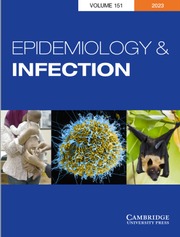Article contents
Post-Scarlatinal Diphtheria
Published online by Cambridge University Press: 15 May 2009
Extract
1. The principle cause of post-scarlatinal diptheria is the admission into the scarlet fever wards of patients who, whether suffering from clinical diphtheria or not, are carriers of virulent diphtheria bacilli.
2. In large centres of population, where diphtheria always exists, diphtheria bacilli are to be found in a not inconsiderable proportion of school-children. In the absence both of evidence of clinical diphtheria and of a history of exposure to that affection, the bacilli are, in the majority of cases, of the non-virulent or saprophytic type and of little hygienic importance; in cases, on the other hand, where the clinical supports the bacteriological examination the bacilli are almost certainly virulent, and therefore dangerous; while in cases where the patient is known to have been exposed to infection the chances are great that the organisms are of the pathogenic variety, and such cases should always be regarded with grave suspicion.
3. On account of the prevalence of the non-virulent bacillus and the fallacies of single cultures, it may be doubted whether a routine bacteriological examination of throat and nose of all patients on admission would prove of sufficient value to repay the labour involved. Chief reliance must be placed on a careful inspection on admission, not only of the throat, but also of the nasal cavities, bacteriological examination being resorted to in cases of doubt.
4. In eradicating infection from an invaded ward bacteriological methods are, on the other hand, of prime importance, since children with apparently healthy throats and noses are often found to have acquired the virulent bacillus. An attempt to stamp out any outbreak of diphtheria by bacteriological examination of the throat alone is, however, futile, owing to the frequent infection of the nasal cavities.
5. Fibrinous rhinitis, which appears to be a not infrequent, though often unrecognised, affection of children is a common form of postscarlatinal diphtheria.
6. Although the treatment of diphtheria in the same hospital has no appreciable influence on the incidence of this complication of scarlet fever, it is advisable that precautions should be taken lest nurses harbouring diphtheria bacilli carry infection from the diphtheria to the scarlet fever wards.
7. To limit the risk of exposure to infection many-bedded wards should be avoided, and the mixing of patients from different wards prevented.
- Type
- Research Article
- Information
- Copyright
- Copyright © Cambridge University Press 1902
References
page 290 note 1 Trans. of Epidem. Soc. Lond., XII.Google Scholar
page 292 note 1 Trans. of Epidem. Soc., Lond., XV.Google Scholar
page 293 note 1 Lancet, 09. 26th, 1896, p. 876.Google Scholar
page 293 note 2 loc. cit.
page 295 note 1 New York Medical Record, 29th 09. 1894.Google Scholar
page 296 note 1 Brit. Med. Journ., 15th 04, 1899, p. 893.Google Scholar
page 296 note 2 loc. cit.
page 297 note 1 Boston Med. and Surg. Journ., 22nd 11., 1900, p. 516.Google Scholar
page 297 note 2 Amer. Journ. of Med. Sciences, 10, 1894.Google Scholar
page 297 note 3 Zeitschr. f. Hygiene, 1899, Bd. XXXI., s. 433.Google Scholar
page 297 note 4 Brit. Med. Journ., 15th 06, 1901, p. 1474.Google Scholar
page 298 note 1 “Dissertation,” Utrecht. Ref. Baumgarten's Jahresbericht, 1898, s. 216.Google Scholar
page 299 note 1 Deutsche med. Woch., 1895, XXI.Google Scholar
page 299 note 2 New York Medical Record, 29th 09., 1894.Google Scholar
page 299 note 3 loc. cit.
page 299 note 4 Trans. of Epidem. Soc., Lond., XIX.Google Scholar
page 300 note 1 loc. cit.
page 300 note 2 Deutsche med. Woch., 1895.Google Scholar
page 300 note 3 loc. cit.
page 300 note 4 Trans. of Epidem. Soc., Lond., XIX.Google Scholar
page 300 note 5 Journal of Hygiene, I., pp. 228, 235, and 485.Google Scholar
page 301 note 1 Journal of Hygiene, II., p. 170.Google Scholar
page 301 note 2 Ref. Park and Beebe, loc. cit.Google Scholar
page 301 note 3 Trans. of the Assoc. of Amer. Physicians, XV., 1900, p. 222.Google Scholar
page 301 note 4 loc. cit.
page 302 note 1 Path. Soc. of Lond. Trans., 1898.Google Scholar
page 302 note 2 Zeitschr. f. Hygiene, Bd. XXXV., p. 87.Google Scholar
page 302 note 3 Journal of Hygiene, I., p. 497.Google Scholar
page 304 note 1 Med. Chir. Trans., LXXXII.Google Scholar
page 304 note 2 University Medical Magazine, 10., 1896.Google Scholar
page 305 note 1 Lancet, 8th 05, 1898, p. 1458.Google Scholar
page 307 note 1 Brit. Med. Journ., 21st 12., 1901, p. 1799.Google Scholar
page 307 note 2 loc. cit.
page 308 note 1 loc. cit.
page 309 note 1 loc. cit.
page 309 note 2 loc. cit.
page 309 note 3 Boston Med. and Surg, Journ., 7th 03, 1901.Google Scholar
page 310 note 1 Trans. of the Assoc. of Amer. Physicians, XV., 1900, p. 222.Google Scholar
page 310 note 2 Journal of State Medicine, VIII., p. 182, 03, 1900.Google Scholar
- 2
- Cited by


